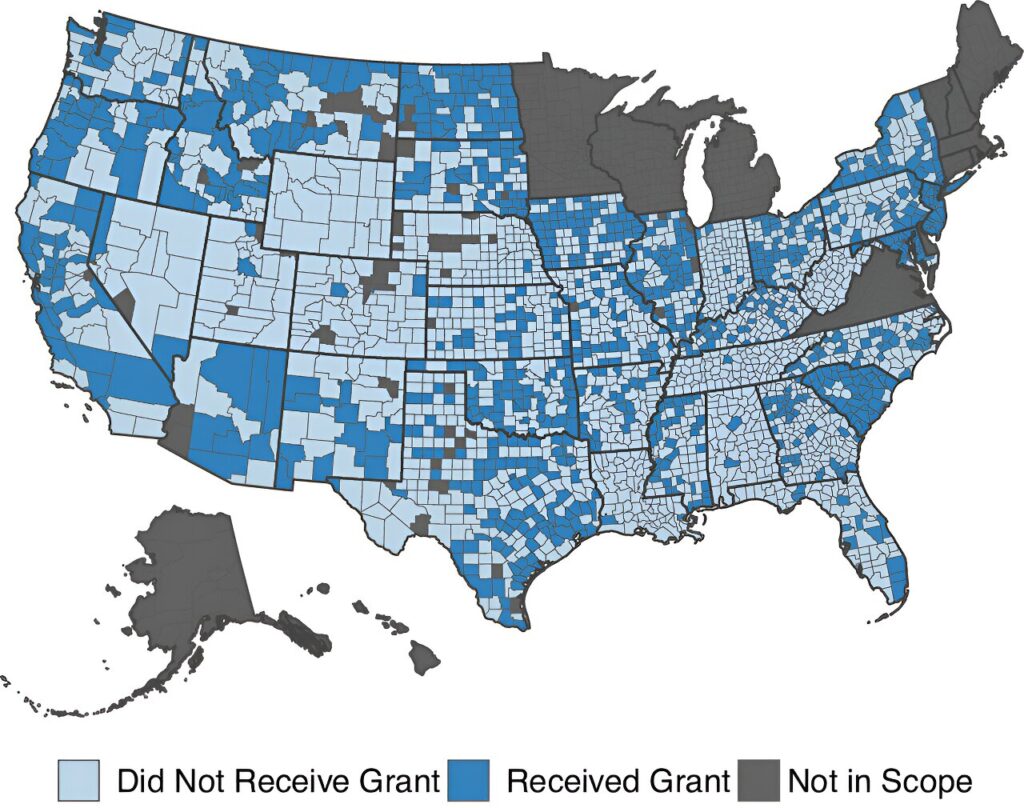Geographic distribution of grants. Credits: Proceedings of the National Academy of Sciences (2024). DOI: 10.1073/pnas.2317563121
× close
Geographic distribution of grants. Credits: Proceedings of the National Academy of Sciences (2024). DOI: 10.1073/pnas.2317563121
Joe Biden did not receive a material advantage in the 2020 presidential election from coronavirus-related private funding, according to a new study co-authored by Daniel Thompson, assistant professor of political science at the University of California, Los Angeles (UCLA). It is said that
It was published in the magazine Proceedings of the National Academy of Sciences, The study refutes longstanding claims by conservative leaders that these subsidies influenced election outcomes.
“I can say with confidence that funding has not significantly improved the performance of Democratic candidates,” Thompson said. “Democratic counties were significantly more likely to apply for these grants, so there was at least reason to wonder, but the effect on turnout was so small that it was unlikely to have a noticeable impact on the results. There wasn't.”
To conduct their research, Thompson and co-author Apoorva Lal, then a doctoral candidate at Stanford University and now a data scientist, analyzed administrative data from counties that won these grants. It was compared to counties that did not receive the money but had similar previous turnout rates and voting trends. —Using new advances in statistical methods.
“Many reforms have sought to limit the influence of money in politics by changing who can spend how much money on which races,” the authors write. “Many public officials and the public are concerned that donations to support local election administration provide a new, previously unused way to influence election outcomes without directly donating to candidates. However, our findings suggest that this may not be a major risk.”
At the center of the debate is the so-called “Zuckerbucks.” This is more than $400 million in grants provided by Facebook founder Mark Zuckerberg and his wife Priscilla Chan to help fund COVID-19-related efforts across the country amid insufficient funding from Congress and states. The purpose was to cover the cost of setting up polling stations.
The couple's donations went to two nonpartisan organizations — the Center for Election Innovation and Research and the Center for Technology and Civic Life — and the grants ultimately paid for equipment like plexiglass dividers, extra poll workers, and tabulating machines to handle the influx. As mail-in voting increases, the controversy has only grown.
As the issue heats up across the U.S., particularly former President Donald Trump, who called Zuckerberg a “criminal” in an email to supporters in 2021, 28 states have moved to administer elections so far. private funding is prohibited.
According to the authors, these developments have more to do with partisan politics than an evidence-based and unbiased response, and that the public and lawmakers are demanding a more scientific approach to these important issues, especially as the 2024 presidential election approaches. It warns that it should be viewed in a strict manner.
“While there are important value questions about how we should set policy around election administration, how it affects election outcomes is not our first concern,” Thompson said. Stated. “When reliable research designs are reflected in the data, we find that many of the strong claims that one party benefits from election administration are exaggerated.”
For more information:
Apoorva Lal et al., Did Private Campaign Finance Benefit Democrats in 2020?, Proceedings of the National Academy of Sciences (2024). DOI: 10.1073/pnas.2317563121
Magazine information:
Proceedings of the National Academy of Sciences

